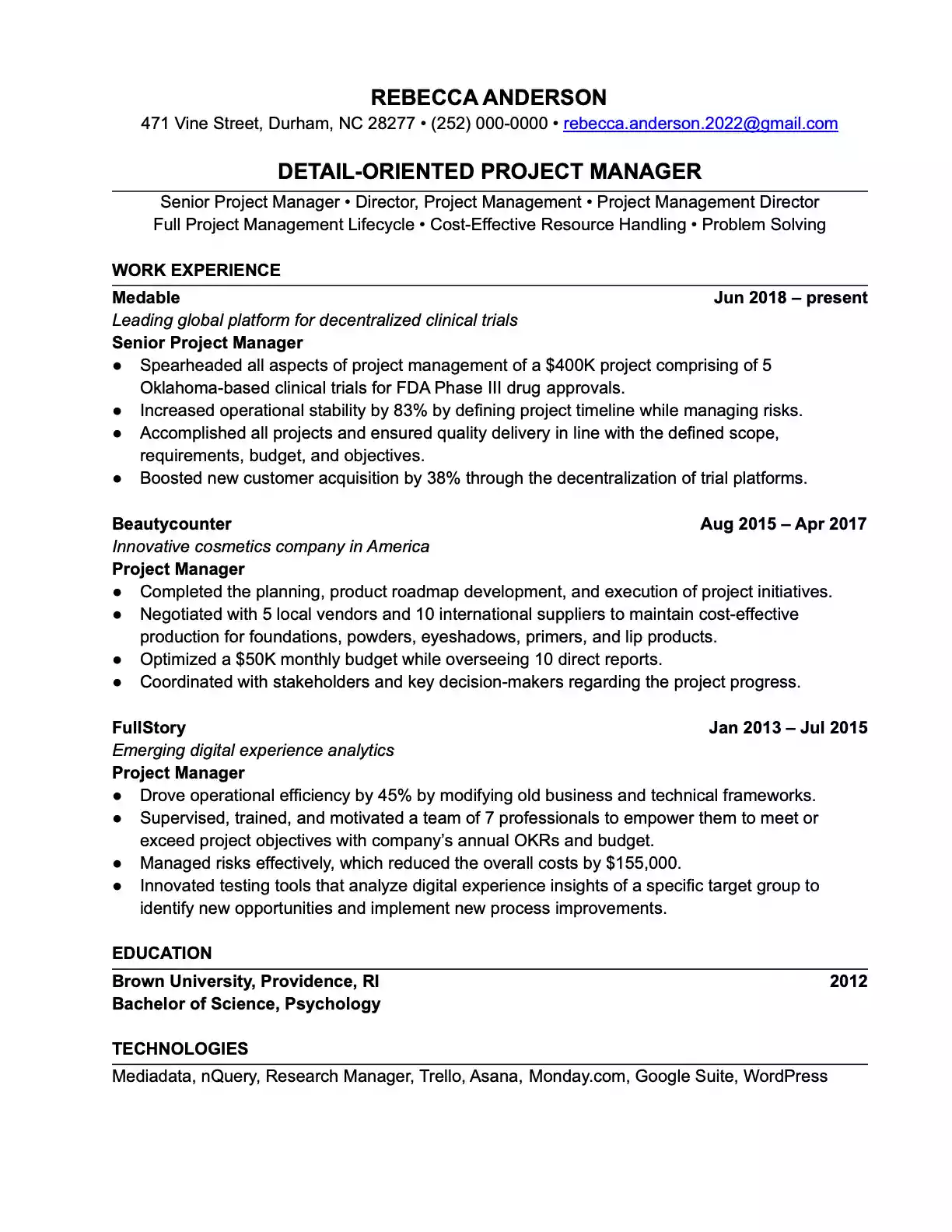Project Manager Resume Example
To land your dream job in project management, you'll need a resume that showcases your organization, planning, and management expertise.


An example of a great Project Manager resume
A great resume is an advertisement for your career. You're advertising your skills and talents to future employers in the hopes that you'll get invited for an interview for a project manager role. Like all great advertising, your resume needs a great headline.
The project manager resume example above uses the headline 'Detail-oriented Project Manager' in order to make Rebecca's resume stand out. It highlights perhaps the most important characteristic of a project manager – that she is detailed. And it makes clear to someone from HR or a recruiter, as they go through an enormous pile of resumes, that this one is for a Project Manager. As obvious as that is to you, it's not at all obvious to the audience for your resume, so it's best to make that bold description stand out.
Following the headline is a professional summary that mentions and puts a spotlight on your most important and most relevant skills, accomplishments and achievements. For Rebecca, that includes managing the entire project management lifecycle, ensuring cost-effective resource handling, and problem solving. Your own career may have different capabilities and talents you'd like to highlight, and the professional summary is the best place to do it.
How do you write a great Project Manager resume?
A project manager resume should show your ability to manage complex projects, influence the members of your team, and that you possess the necessary technical skills to succeed. Your resume is marketing for your career, so it should market you as effectively as possible. That means including all of the relevant skills and achievements you've compiled so far.
Relevant skills for a project manager resume include time management, project management methodologies, budget management, conflict resolution, active listening, risk management, and on-time performance. You should avoid vague soft skills that anyone can claim on their resume - team leadership, good communications, strong organizational skills - these are subjective assessments and don't help your resume stand out from the pile.
It's best to list specific capabilities that you have in project management, whether that's complex, multi-part projects, or healthcare, or technical project management. If there are specific fields, methodologies or industries in which you're strong, make sure to include those keywords on your resume. Construction project management varies from pharmaceutical project management and is different from regulatory project management. So making it clear to your readers which are your strengths is helpful for getting your resume noticed.
You'll also want to include achievements - the specific results that you have produced in your career that indicate you can put those skills and capabilities to good use. If you can use numbers to describe your accomplishments, it's much better for making your success concrete to the reader. In Rebecca's case, she highlights that she 'drove operational efficiency by 45%', which gives her future boss a sense of the scope and scale of achievements that she can deliver.
If you'd like Leet to help you create an achievement-driven resume for free, sign up here.
Getting promoted as a project manager
The key to getting ahead in project management is to demonstrate your ability to manage larger and more complex projects to their successful conclusion. You should highlight the achievements in your resume that are the best indicators of your ability to rise to the next level. In many cases, this will include duties or responsibilities that are not in your job description, but rather, belong to the next level higher in your career development. It's especially important that you bring attention to these achievements that indicate you're already performing at a Director, Project Management level.
So getting a promotion at your current company, or being hired at the next highest level at a new company, are both dependent on featuring the work you're already doing at that level. The best way to prove you're ready for the next step is to take it.
Project manager skills
In addition to achievements and accomplishments, skills are important to highlight on your project manager resume.
Don't merely list the duties and responsibilities of your role. First, your future boss already knows what the duties and responsibilities of roles similar to yours are. After all, he's not only hired at that level, he probably had your job once too!
Second, you're advertising for a new job, not your old job, so it doesn't help much to put a lot of detail about what your past job expected. It's much better to focus on what you delivered.
And third, the relevant duties and responsibilities are the ones for the job you're pursuing. And it's most effective to advertise your capabilities at fulfilling those higher level duties and responsibilities, rather than using scarce and valuable resume space on duties from your past.
For each important project management skill, showcase how you used that skill to achieve something to the benefit of your company or team. So for time management, project management methodologies, budget management, conflict resolution, active listening, risk management, and on-time performance you might indicate something similar to:
- Time management: "Managed complex, multi-stage project with $15 mm budget through three cycles and brought in one month ahead of schedule."
- Methodologies: "Delivered technical project 15% under-budget using a combination of waterfall and agile, where each was appropriate, including the development of novel, patentable R&D."
- Budget: "Successfully reduced expenses $2.2 mm on annual project deployment through re-use of prior work and materials."
- Conflict: "Improved team satisfaction scores by 12% by resolving long-simmering dispute between marketing and engineering sales teams."
- Active listening: "Secured cooperation leading to 23% productivity improvement by using active listening to identify problem areas in the project and driving team members to address the 'elephant in the room.'"
- Risk management: "Managed losses to 7% below budget by using state-of-the-art risk-reduction and risk prediction tools."
- On-time: "Improved on-time performance of the team by 31% by instituting regular weekly and monthly reviews of progress and blockers, leading to the identification of three simple fixes that were holding the team back."
These may or may not be relevant to your specific career path, but what is essential is for you to create bullet points that showcase your skills by demonstrating, using words and numbers, what you were able to achieve with those skills.










